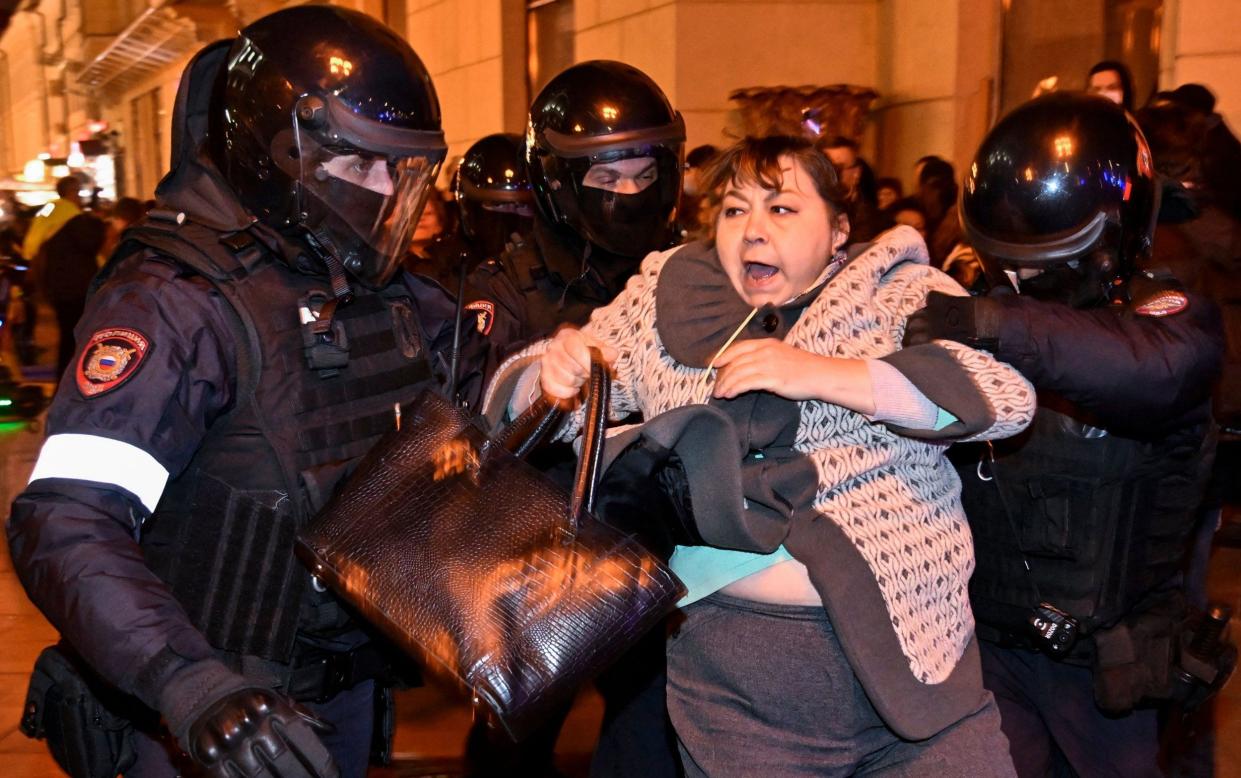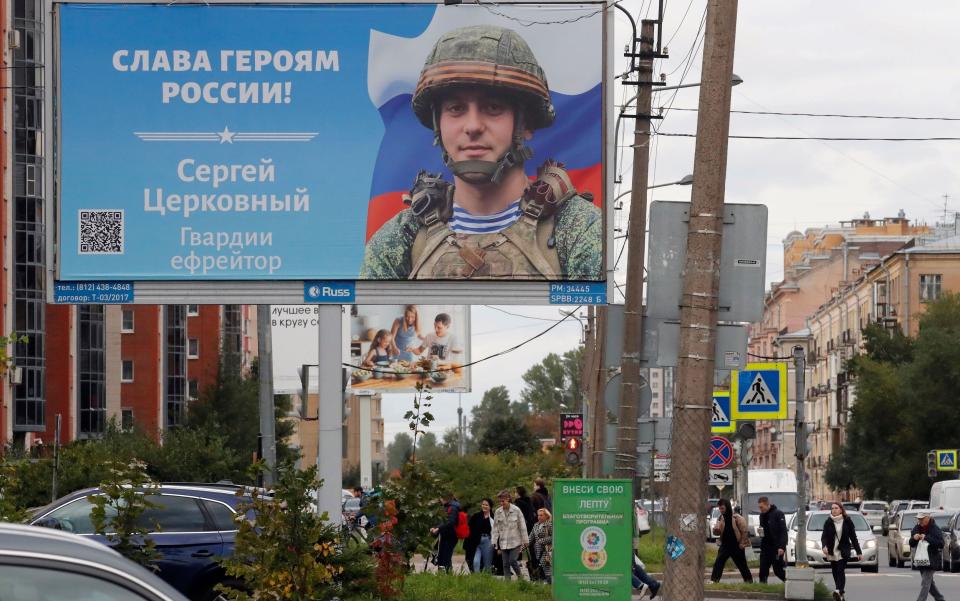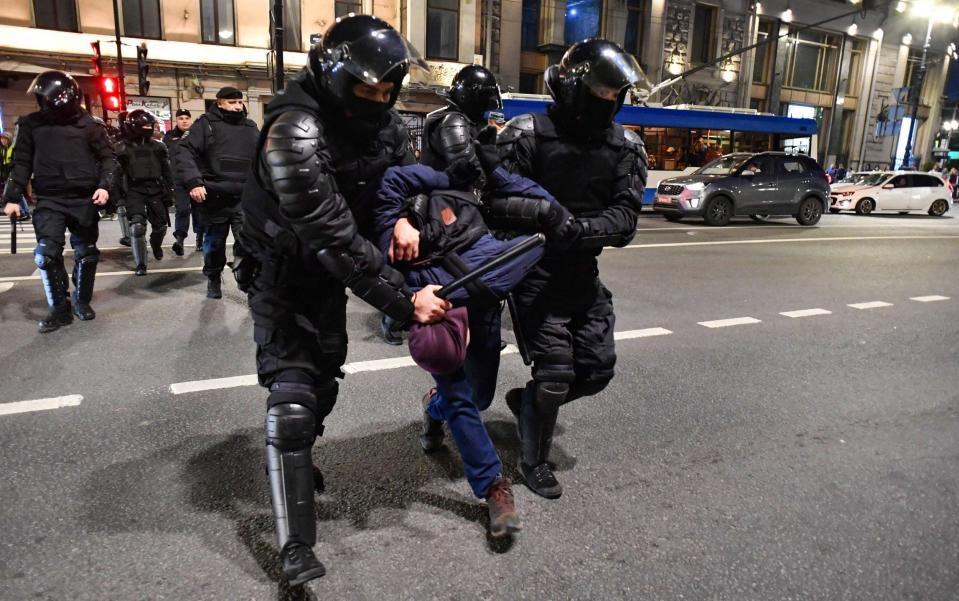In Moscow, Putin’s ‘invisible war’ is now impossible to hide

- Oops!Something went wrong.Please try again later.
Until this week, Vladimir Putin’s Ukraine war had been almost completely invisible to most Muscovites.
Prominent ‘Z’ signs – the war’s symbol – had disappeared from awnings, shop windows and even private cars in Russia’s capital by April.
Closed-down branches of McDonald’s and Starbucks were replaced by local lookalike clones. Restaurants, cafes and nightclubs continued a roaring trade.
After a short period of panic buying at the beginning of the war, supermarket shelves were full – including many sanctions-busting imported goods – and the rouble even rose to new heights. Citywide festivities continued as normal, and with the exception of a handful of shows deemed ‘unpatriotic’ by a new Duma committee, the theatres were packed too.
“Moscow is an enchanted kingdom where everything is completely, completely normal and nothing bad is happening anywhere,” joked one prominent Moscow theatre producer. “Definitely in no way the capital of a country fighting the biggest war of the 21st century.”

On Wednesday that illusion came crashing down in the wake of Putin’s belligerent speech announcing partial mobilisation. For millions of Russians who had wilfully ignored the conflict, the war in Ukraine suddenly went from near-invisible to urgent and personal.
Though Putin and his defence minister Sergei Shoigu went to great lengths to emphasise that the call-up of what could now be a million military reservists concerned just “people with military experience” and that “students have no need to worry”, the sudden call to arms of mostly unwilling men came, in the Russian phrase, like a thunderclap from a clear sky.
“Every Russian knows that when the government says it definitely isn’t going to do something, it's about to do it,” said Irina Bukova, 43, a Moscow psychologist whose 48-year-old partner did his compulsory military service in the early 1990s.
“They say the mobilisation is just of former professional soldiers. But everyone is talking about how the next step will be of anyone who ever had military training of any sort.”

According to Bukina, one neighbour reported that her recently graduated architect son and all his classmates – who had undergone compulsory military training as sappers at university – had received call-up papers.
Introducing even partial mobilisation has been a move that the Kremlin had strenuously avoided until now, with Putin making a solemn promise on International Women’s Day on March 8 that conscripts "do not and will not participate in hostilities".’
But a nationwide recruiting campaign by both the Russian Army and the Kremlin-affiliated Wagner Group private military company have clearly failed to produce sufficient volunteers despite offering signing bonuses equivalent to several month’s pay and actively recruiting thieves and murderers from Russian prisons. The Kremlin’s attempt to fight the war with an army of expendables had failed.

On Moscow’s Old Arbat street, a crowd of about 200 mostly young people assembled for a protest. Many wore facemasks in an attempt to avoid being spotted by facial recognition cameras – a favourite tactic in the wake of sporadic protests in February and early March.
“No to War!” they chanted in unison before riot police moved in with lightning speed to bundle them into waiting buses.
“I am not afraid of anything any more,” said Maria, a middle-aged woman who had joined the protest. “I will not give my children to fight this bloody war.” Another young woman, who clung to two male friends as police dragged them away, shouted: “Putin is a traitor! He has ruined Russia!”
According to the OVD-info human rights organisation, some 1,300 people were detained at protests in more than 30 Russian cities with most of them being released after paying fines of up to £700. But many military-age male protesters were not so lucky.
Several opposition activists including Kirill Goncharov, senior member of the Yabloko party, on Thursday published photos of call-up papers ordering them to report to local draft offices.
Conscripts are, for the moment, still not eligible for front-line military service in Ukraine but military service is clearly being used as a punishment for dissent. “It was only to be expected that [authorities] started using mobilisation from day one to put pressure on the protesters,” said Pavel Chikov, head of the Agora association of human rights lawyers.
Vladimir Solovyov, the leading Kremlin propagandist, promised on his Telegram channel that all opponents of the regime would find themselves immediately in uniform. The police “will check documents immediately on the spot, identify them, detain them and send them to military registration and enlistment offices”.

Russian social media quickly coined the term "mogilizatsita" for Putin’s call-up, a mash-up of the Russian word mogila, or grave, and mobilisation.
Unusually long lines to leave the country were reported overnight on Wednesday and Thursday morning at once-sleepy border crossings including those with Mongolia and Kazakhstan in the east and Georgia in the south, where hundreds of cars were pictured stuck in a night-time massive traffic jam.
In the Chelyabinsk region that borders Kazakhstan, dozens of men were seen standing near their cars in the vast steppe just after dawn.
At Moscow airports, border guards reportedly conducted spot checks on young men, quizzing them about their eligibility to be called up.
Putin’s sudden decision to reverse six months of so-called "hidden mobilisation" and go public with a nationwide, if so far partial, call-up took not just ordinary Russians but political insiders by surprise. “I believe many people [in the Russian elite] were taken aback,” said one former senior Kremlin official who worked closely with Putin until 2016.
“Politically, this is a move that you would not make unless you were desperate – that is a change of message. Everything is not going to plan.”
Putin was low-key in Vladivostok
Indeed Putin himself in recent speeches in Vladivostok and Samarkand had gone out of his way to be as boring and low-key as possible, talking about the “challenges” to the Russian economy but not explicitly mentioning the war at all.
Though the protests against mobilisation were small, the sudden rise in visibility of the war is likely to send politically dangerous shock waves through Russian society. Though a large majority of Russians still claim to support Putin, private Kremlin polling leaked in July showed that Russians were evenly split between supporting a continuation of the conflict or making peace.
Some 15 per cent of respondents were strongly in favour of what the Kremlin calls the "special military operation", a similar number strongly against, with a 35-35 per cent divide between those who were mildly for and mldly opposed.
After Putin’s partial mobilisation, one thing is clear: the Kremlin plan to keep the war low key and fight it using expendable volunteers, colonial troops from ethnic minority provinces such as Buryatia and Chechnya and prisoners has failed.
With hundreds of thousands of Russians facing the prospect of being sent to war against their will under threat of jail, Putin’s war – and its failures – has suddenly become very much no longer invisible.
The author of this dispatch remains anonymous due to reporting restrictions

